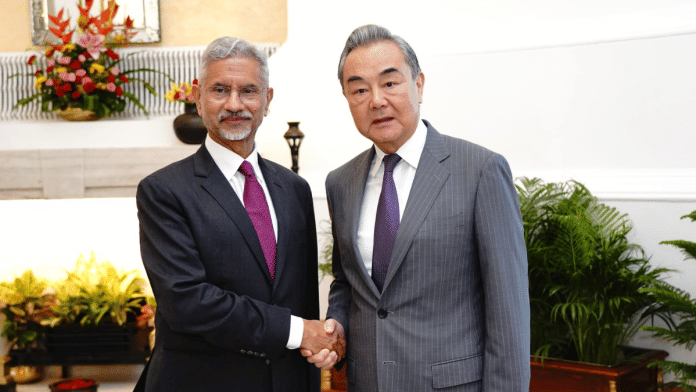New Delhi: The Indian government has denied any change in its position with regards to Taiwan, after the Chinese readout of the meeting between S. Jaishankar and Wang Yi, mentioned that the Indian external affairs minister described the island country as a part of China.
The Chinese readout Monday of the two foreign ministers’ meeting ascribed the following quote, that has been translated into English, to Jaishankar: “The relationship between India and China remains stable, cooperative and forward-looking, which is in line with the interests of both countries. Taiwan is a part of China.”
“There is no change in our position on Taiwan. We stressed that like the rest of the world, India has a relationship with Taiwan that focuses on economic, technology and cultural ties. We intend to continue it,” a government source told ThePrint.
Though India has acknowledged the ‘One-China Policy’ in the past, which asserts that Taiwan is a part of China, it has maintained, in recent years, economic linkages with the self-governing territory that has remained outside the ambit of Beijing since the end of the Chinese civil war in 1949.
Last year, Taiwan President Lai-Ching te had congratulated Prime Minister Narendra Modi on his electoral victory after the general elections. Modi had responded to the greetings, while adding that New Delhi hopes for closer ties with Taiwan, which led to a strong protest from Beijing.
At the time in June 2024, Mao Ning, a Chinese foreign ministry spokesperson, rejected Lai Ching-te’s position as the “President” of Taiwan, and further urged New Delhi to resist Taipei’s “political calculations.”
India was one of the first countries to recognise the foundation of the People’s Republic of China (PRC) led by the Communist Party on 30 December, 1949, ahead of other countries including the UK and the US.
Chinese President Xi Jinping has indicated that the reunification of Taiwan with China is one of the key priorities of his government. In recent years the People’s Liberation Army (PLA) has increased its activities surrounding Taiwan, including conducting war games.
Only 12 countries in the world maintain ties with Taiwan. The US does not officially recognise Taiwan, but maintains a policy of ‘strategic ambiguity’ by declaring that it is against any “forceful” change in the status quo.
Chinese Foreign Minister Wang Yi is in India for a three-day visit that began Monday. He met with Jaishankar Monday evening and will meet National Security Adviser Ajit Doval Tuesday morning for the twenty-fourth meeting of the Special Representative mechanism. Wang is also expected to call on PM Modi later Tuesday evening before departing Wednesday morning.
Jaishankar, at the meeting with Wang, had highlighted that the two countries faced a “difficult period” and now seek to move forward with ties. Modi is expected to visit China at the end of the month for the Heads of States Summit of the Shanghai Cooperation Organisation (SCO) in the city of Tianjin.
Wang assured Jaishankar that China will take steps to address the exports of fertilisers, tunnel boring machines and rare earth elements to India that have come under strain over the last year. This was a part of the concerns raised by the Indian external affairs minister during the meeting.
The thaw in ties between New Delhi and Beijing comes at a time when ties between India and the US have hit a rough patch. US President Donald Trump has targeted India for its continued purchase of Russian oil, imposing tariffs of up to 50 percent on Indian goods.
Ties between India and China have seen an uptick in engagement at different levels of government in the last ten months. Diplomatic relations cratered following the military clashes in Galwan during the summer months of 2020.
However, on 21 October 2024, Foreign Secretary Vikram Misri announced that India and China had reached an agreement for the disengagement at the friction points across the Line of Actual Control (LAC). This agreement paved the way for a meeting between Modi and Xi on 23 October 2024 on the margins of the BRICS summit in Kazan, Russia.
Since then both New Delhi and Beijing have introduced confidence building measures including the resumption of the Kailash Mansarovar yatra and the issuance of tourist visas to Chinese citizens.
(Edited by Tony Rai)
Also Read: India in talks with China for resumption of trade via 3 border passes ahead of Modi’s SCO visit







Taiwan should seriously think about recognizing the LAC defined by India and agree that Arunachal Pradesh is belong to India.